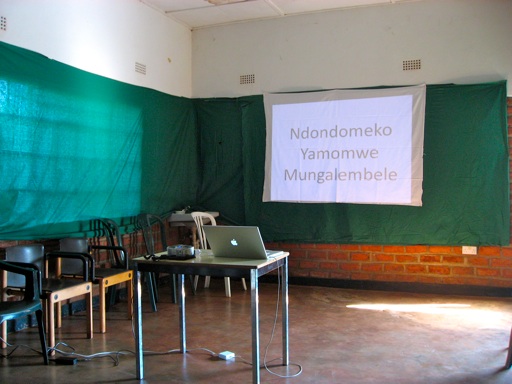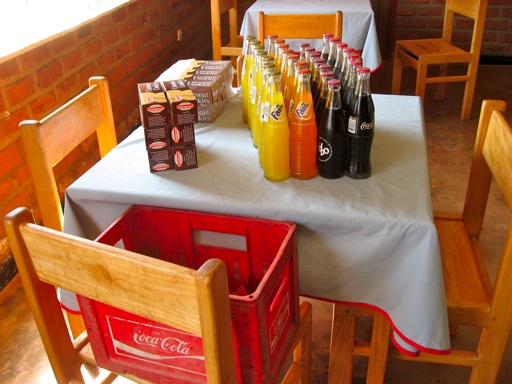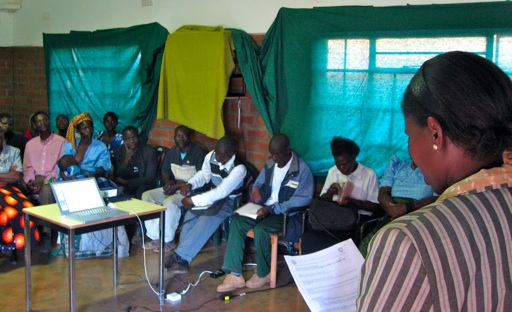The glaring problem that we identified when visiting our target student population of HIV support groups and Village AIDS committee was the lack of long-term planning. It seemed like these people focused on meeting their own daily needs for basic necessities in the present, and that planning for the future was an impossibly difficult task. To address this problem, the hospital decided to encourage planning for the future by requiring an action plan from each of the HIV Support Groups and VACs. However, when we requested action plans from some of the groups that we had visited, we received plans that ranged from being comprehensive to being rather cursory. Therefore, we decided to integrate lessons on 1) developing an action plan, 2) developing a budget, and 3) keeping an accounting ledger, all to encourage planning for the future. Moreover, these lessons would instruct our students how to implement what they had previously learned in our previous session with the six lessons from Barefoot MBA.

Action Plan Lesson
During the Action Plan lesson, I noticed an absence of class participation, which was quite odd since I had structured questions concerning the importance of vision in developing an action plan. Vision is important because it represents a long-term goal or dream that provides motivation and direction. A vision can guide actions and unify a group of people to work in a united effort, which is especially important for these HIV Support Groups that have a hard time motivating their members to contribute to the group. At first, I thought that Angela (HIV Support Group Liaison who was the one lecturing) was skipping over the Vision section of the lecture. However, I found out that Angela did in fact go over the Vision section of the lecture. The responses to “What is your vision?” were just inadequate: most of the students simply said that their vision was to “start a business.”
The problem with the vision of “starting a business” is that it’s short-term and hardly provides the guidance for future actions. Yes, starting a business is a goal, but what’s the true purpose of starting the business? Is it to ensure financial and food stability during the infamous “hungry season” that lasts from September to January? Is it for personal gain? Is it to send children to secondary school? Is it to start an HIV orphanage? My point is that the vision “starting a business” isn’t a great vision because it’s a means to an end that hasn’t been specified. The vision should be the end. It should be the dream that not only guides and provides a clear path for actions, but continually motivates everyone. “Starting a business” is an action that one can take, but it is by no means the dream or long-term goal that people are shooting for. What happens when one “starts a business?” If one says their vision is to “start a business,” then I guess one has already accomplished their dream, and must come up with another vision to replace their previous, short-term vision. Perhaps the reason why our students gave the answer as “starting a business” is simply because our entire trainings were focused on business skills, and they thought that this was a satisfactory answer.
It took me a while to explain this to Angela, and she either understood it quite well or was in polite agreement, which is customary for Malawians. It was just impossible to understand what exactly was going on during class and judge whether or not our students really understood our lessons. During the first class two weeks ago, Angela started to translate students responses for us, but we told her to stop since that would make the class too inefficient and bore the students (who didn’t know English). Perhaps the best solution is to ensure that 1) the teacher fully understands the entire lesson (maybe make the teacher rehearse the lesson in English to ensure the teacher’s comprehension) or 2) learn the native language.
Microfinance Loan Survey
After the budgeting lesson, we passed out a paper survey to assess students’ knowledge of microfinance loans. During our first training, we had given a lesson on debt, and the students had asked why we were not offering them money. We were shocked, and we became very interested in finding out whether our students knew of how to obtain a loan from the biggest microfinance organization in Malawi, Opportunity International Bank of Malawi (OIBM). Tiffany designed a 8-question survey that assessed the students’ knowledge and experience with microfinance. Administering the survey was frustrating: questions were left blank or answered in the incorrect form, even after Angela had provided additional instruction. We had to look at each survey one-by-one before collection to ensure that all the questions were answered completely and correctly, to ensure the validity of the survey. Nevertheless, the initial results were interesting: most of them knew of OIBM, some of them had tried to get a loan, but very few of them knew how to get the loan, and almost none of them had actually gotten the loan.

Accounting Lesson
Despite being the shortest in duration, the accounting lesson was definitely the most interactive and fun. When we visited the HIV support groups, we noticed that those that did keep records kept stray pieces of written paper in plastic bags. It looked like records could have easily been lost or damaged among the jumble of papers. Therefore, we wanted to get accounting books for our students to encourage organization and maintenance of financial transactions related to their support groups. We ended up going to Lilongwe to purchase accounting books from ShopRite, which is a major South African supermarket chain all over southern Africa. We stapled printed review material in Chicewa to the covers of each accounting book as reference. We also purchased blue pens and plastic sleeves to protect the books from the prevalent red dust here. We bundled the three and gave an accounting package to each of the HIV support groups and Village AIDS committees.


Their excitement and gratitude were apparent, especially as the treasurer of each group came up to the front of the room to receive his/her accounting kit. It was also apparent that other members who were not in possession of a kit were jealous.



At the end of the training sessions, some of the students rose for a couple minutes to speak. Since it was in Chichewa, we only found out later that our students were expressing the gratitude for the trainings we had put on for them, especially since it had been about a year since they had received trainings at the hospital. Of course, Tiffany and I were grateful that they had expressed their appreciation, and it was only at the end of the fourth and last training did we have the opportunity to say our “parting words” with the students.



